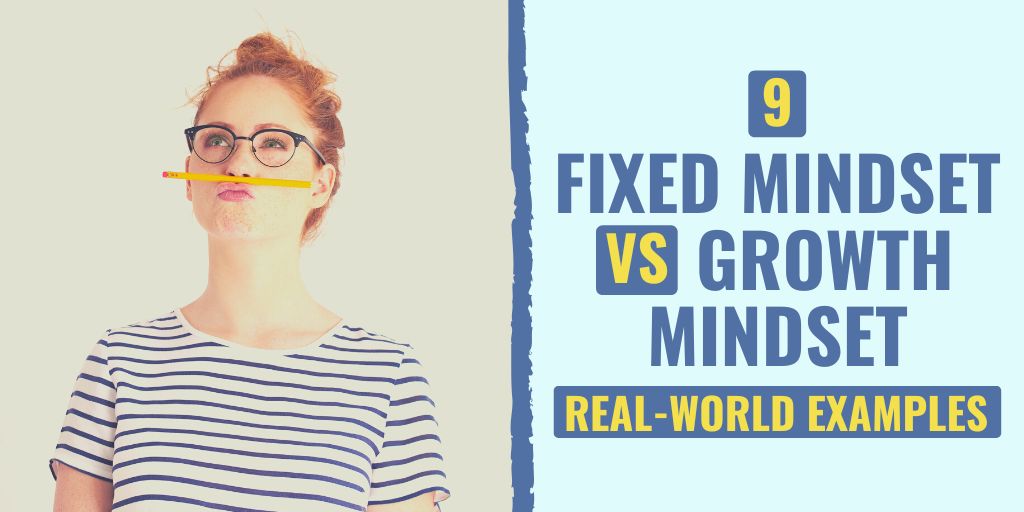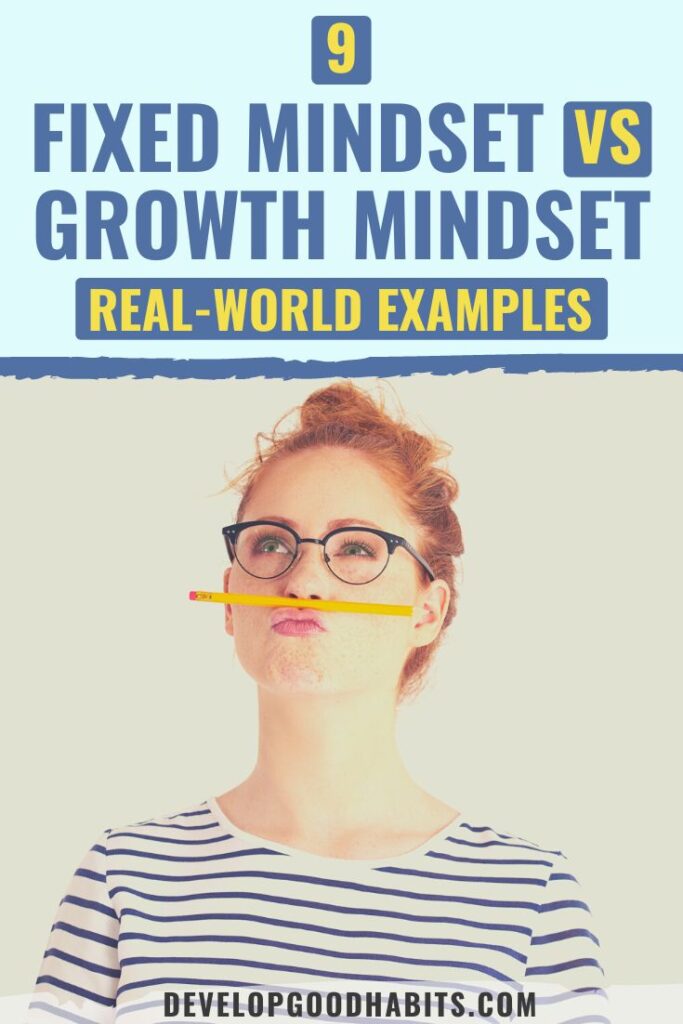When I was in elementary school, I had a friend who played the violin–which was so cool because she was the only one who could do it.
Similarly, we had one girl in our grade who was a standout gymnast and one who did horseback riding competitions on the weekends. And of course we had that smart girl.
These girls were born with unique talents that the rest of us didn’t have.
Or, so I thought.
I guess I assumed they just always knew they were born with some quality or characteristic that allowed them to do things that not everyone else did–or at least as well as they did it.
All three girls dropped their respective hobbies prior to going into high school, but I always thought of each of them as being someone born with an ability that I simply did not innately have.
My mindset about my skills and talents (or, lack thereof) was fixed.
We’ve discussed fixed and growth mindsets before, but let’s do a quick recap. Stanford University researcher Carol Dweck argues that everyone has one of two mindsets: a growth mindset or a fixed mindset.
People with a fixed mindset believe that their most valuable personal characteristics (such as personality, talents, and skills) are largely set in stone and cannot be changed. This limiting mindset leads to a constant need to protect their ego, avoid failure, and justify their sense of self.
However, those with a growth mindset believe they can develop any personal quality or ability by putting in the effort and being persistent. This mindset leads to a love for learning, a passion for personal development, and a sense of confidence and resiliency when faced with challenges.
People with a growth mindset believe they can cultivate their skills with time and practice, so they can often be found putting extra work in to achieve a higher success rate.
Which of these mindsets do you think is better if you want to hold yourself back in life? Which one do you think is more suitable for those who want to break out of the everyday norm and exceed even their expectations?
In this article, we will examine nine scenarios viewed by someone with a growth mindset and by someone with a fixed mindset. By applying these mindsets to these specific situations, you will quickly see the benefits of living with a growth mindset.
Before we proceed, if you prefer to watch instead of read, check out the video version of this article:
Let’s get started.
1. Intelligence
Carol Dweck’s research is largely based on intelligence. This spawned from a childhood experience in which she had a teacher who seated everyone in the class according to their most recent IQ test scores.
This meant that the students with the highest IQ had the first seats in the class, and the rest followed behind in descending order.
Dweck recalls that this was as damaging for those at the top as it was for those at the bottom, as students were defined by their test scores–and those at the top (including herself) were always concerned about making a mistake and losing their spot.
Dweck finished the year wondering why her teacher believed so firmly that intelligence was a fixed trait while Dweck thought it could be cultivated.
Dweck found in her subsequent research that people's personal views on where intelligence comes from have a huge impact on their motivation to learn.
People with a fixed mindset—those who believe they’re either born with intelligence or they’re not—are largely focused on how smart they are. They prefer to stick to tasks that they’re familiar with so they can avoid potentially making a mistake.
On the other hand, people with a growth mindset see intelligence as something that can be gained with experience, so they want to keep challenging themselves with new tasks to improve upon their current abilities–even if it takes time, effort, and trial and error.
Examples of fixed mindsets and growth mindsets regarding intelligence probably occur more frequently in everyday life than you realize.
But let’s look at a scenario where your boss approaches you with a new project that involves a new type of software that you’ve never heard of before. What are your first thoughts?
A Growth Mindset Response Regarding Intelligence
Sure, I can take on this new challenge. I’ve learned new software systems in the past, so I should be able to pick up on this one pretty quickly.
This project is new to me too, but I’m sure I can find the resources that are required in order to be successful. I’ll learn as I go and will then be able to teach others.
A Fixed Mindset Response Regarding Intelligence
Hold on, my boss clearly meant to send this request to someone else. I’ve never heard of this software and I’ve never done this project before, so I can’t do this. I’ll respond and ask who I should forward this responsibility to.
After reading those two reactions, which one do you think belongs to the person who will end up having a successful career, and which do you think belongs to the person who is going to stay in the same position for years to come?
2. Feedback
Remember that those with a fixed mindset prefer to stick to tasks they know to avoid the potential to make a mistake.
This also means that they aren’t often eager to open themselves up to other people’s opinions about their work because when people with a fixed mindset are criticized, they view it as a reflection of their character and are likely to become defensive.
Conversely, people with a growth mindset welcome feedback because they see it as an opportunity to learn and improve themselves.
In fact, they will seek feedback to identify any room for improvement, gap in knowledge, or absence of a skill because people with a growth mindset don’t see these things as being set in stone; they see them as being workable.
With a growth mindset, you want to hear any and all points of view about your work because it could lead to a “lightbulb” moment when you can make personal progress in some way.
For example, you go into a team meeting for a project that you’ve been working on, and one of your teammates comments that your portion of the project needs some work—it’s too short and doesn’t blend in well with everyone else’s efforts.
Let’s look at how you may respond to this, depending on your mindset.
A Growth Mindset Response to Feedback
With a growth mindset, you would stop to consider the facts behind this feedback, look at it objectively, and maybe start a larger conversation with the entire group about it.
If your teammate has a valid point, you may start to notice that what you once thought of as being “concise” is actually really cutting out some important bits of information that would make your work more comprehensive.
You take this feedback into consideration and implement the advice that’s given–and when you start another team project in the future, you keep this lesson in mind by being aware of your tendency to simplify things a bit too much.
A Fixed Mindset Response to Feedback
You tell your team that your work is simply more concise, which actually makes it better than everyone else’s because you get to the point without adding in any extra fluff that isn’t useful anyway.
Or, you could with your teammate and feel defeated, thinking you just don’t have what it takes to be on this team.
Putting your own response aside, you can probably tell which person you would want on your team if the roles were reversed.
This can help you recognize that welcoming feedback is much more beneficial than shutting it out–regardless of whether you ultimately decide to honor it or not.
3. Failure
People with a fixed mindset allow themselves to be defined by failure. Because they think that people are either naturally good at things or will never be good at those things, they give up if they hit a roadblock. Why waste time trying to do something you will never be able to do?
Here’s an everyday example. Especially over the past few months with the coronavirus pandemic, many people have had to get a bit creative with their time, as vacations and social gatherings have been mainly cancelled.
This means that people are looking for new hobbies that can be done at home to pass the time.

Understandably, the number of people who have tried their hand at home cooking has gone way up since the start of this virus. And what types of recipes have especially surged in popularity over the past few months? Bread.
If you’ve been wondering why flour has been scarce at the grocery store lately, it’s because the pandemic has brought people back to the basics by giving the gift of time and creating the need for at-home meals.
When coupled together, this has people all over the world making and feeding sourdough starters to bake their own bread—a finicky recipe that is often met with failure.
Sourdough starter is notorious for requiring trial and error, patience, and the ability to overcome challenges. If you’re among the many households who tried–and inevitably failed–your first attempt at making sourdough starter, you came out on the other side of that experience thinking one of two things:
A Growth Mindset Response to Failure
It’s ok, everyone fails at this. There is a learning curve and a lot of variables that go into making a successful sourdough starter, this is just a temporary setback and I’ll get there.
In the words of Winston Churchill, “Success consists of going from failure to failure without losing enthusiasm.” So I’ll assess what may have gone wrong and try again.
A Fixed Mindset Response to Failure
This is pointless and a waste of time because I can’t bake.
One of these attitudes will ultimately leave you with a sourdough starter that you can feed forever and use to always have fresh bread (and will probably leave you among the majority of those surveyed who said they will continue to cook at home after the virus has passed.)
And the other attitude will leave you without an integral component to many meals (and leave you feeling left out of a lot of social media discussions and rob you of any photographic bragging rights you may earn for your carb-ladened creations).
On a greater scale, if your go-to response to failure is to quit, how will you ever progress past where you are right now?
When failures are viewed as learning opportunities and you start to recognize your ability to achieve great things despite any hiccups along the way, you’ll notice that all of your endeavors in life will follow suit.
4. Other People’s Success
Speaking of failure, let’s talk about other people’s success. Do you feel inspired to do the same when you see other people succeed? Or do you resentful because there is only so much room at the top?
Having a scarcity mentality regarding success breeds a cut-throat culture where people try to tear others down to get to the top.
People lose focus on their purpose in an attempt to ensure no one can surpass them. Instead of making efforts to continuously improve themselves, people with a fixed mindset are more concerned with comparing themselves to others.
Let’s say someone at work gained recognition for a recent project that, once implemented, improved the efficiency of a standard process in the office. This made everyone’s life a bit easier–even your own–and there’s been a lot of talk surrounding the “win” ever since.
How are you feeling?
A Growth Mindset Response to Other People's Success
You’re feeling great because a once-arduous task that took up a lot of your time has now become quick and simple. You’re so thankful for your co-worker’s efforts and join in with everyone else’s praise and support toward this person.
A Fixed Mindset Response to Other People's Success
First of all, it’s not that big of a deal and people should get over it. Secondly, what about that quick fix you found a few months ago to a common issue in the office, where was the recognition for that? You’re not going to add to the hype, your co-worker sucks.
People who have a growth mindset are able to celebrate in light of other people’s success and will even go out of their way to help others succeed.
Whether this means sharing the contact information for a great connection you have or teaching someone how to work on a computer system that they’re unfamiliar with, those with a growth mindset aren’t intimidated by any limits that other people’s success could put on their own.
5. Change
If there is anything you can consistently count on in life, it’s that change will happen.
With technology innovations and changes in leadership, companies will evolve, processes will improve, and entire industries will transform. And yes, generally, people are resistant to change. But if you want to keep up with society, you’ve got to get on board with embracing it.
And I think, at this point, people recognize that. Especially in 2020, people have seen that when it comes down to it, sometimes you don’t have a choice aside from rolling with the punches and adapting to new norms.
But how do you react to change?
A Growth Mindset Response to Change
I welcome change! In fact, I enjoy the challenge of learning new things so much that I’m hoping to be an active part of this change!
I recognize that if we make a change and it doesn’t work out, we can go back and reassess our decision. In the long run, it will be critical that we have kept up with any changes in our industry.
A Fixed Mindset Response to Change
Change? Why change anything, everything we do right now is working just fine like it always has. Why would you try to take risks with any type of change?
I’m really just concerned with what goes on in the short-term, and in the short-term changing something sounds like it takes some extra motivation that I don’t really have right now.
A fixed mindset encourages stagnation and is resistant to change. But think of how important and beneficial change has been in your life thus far.
What if you were still the person you were ten or twenty years ago? Can you think of anything in the past few decades that you’ve changed that has led to positive growth? Focus on those things if you ever find yourself being resistant to change.
6. The Process
When you’re working on something, do you focus more on the process of doing it or on the outcome?
If you’re focused on the process, it means you don’t let obstacles get in your way–instead, you find ways to work around them, you know to only worry about the things that are within your control, and you celebrate the small wins along the way.
People who have an intrinsic sense of motivation often focus on the process rather than exclusively the end goal because they enjoy what they do and realize that they add value to whatever they’re doing along the way.
They also recognize what the process can give back to them– the small lessons along the way, opportunities to try new methods of doing things and room for personal development.

If you’re doing something with your life that encourages you to focus on the process because you benefit from doing so, you’ve likely found your niche–and you will want to continue to concentrate on developing your craft and improving yourself from wherever you were yesterday.
When thinking about the process of your everyday tasks…
A Growth Mindset Response to The Process
Reaching my goals requires a lot of progression, so I can’t think about the end quite yet–I’ve got a long way to go until I get there. Instead, I’m focused on my current objectives and meeting smaller milestones on the way to achieving my ultimate goal.
And, because I find the work to be rewarding in itself, I don’t need the end result to end up looking exactly like I had planned it to look. It’s ok if some alterations are made along the way because I’m still learning and trying to figure all of this stuff out.
A Fixed Mindset Response to The Process
I don’t really care how I get there, I just want to make it to the end. I may need to cut some corners along the way, but I’m not really passionate about this work, so I don’t mind. I’m honestly just here for the paycheck, so as soon as I can leave, I will.
You can really see in this example how a lot of the topics we talk about on this site work together. People with a sense of intrinsic motivation value the process of doing their work and are open to new opportunities to learn. They have a strong focus on self-development and continuous improvement.
On the other hand, those who are motivated only by external factors just want to get to the end and don’t really care about the process. They don’t look for opportunities for growth along the way because whatever it is, their heart isn’t in it.
7. Effort
If you’re like me, the amount of effort you put toward something represents your passion for the cause.
If you want to learn something or want to achieve a goal, you’re willing to give it your all and go above and beyond to get what you want.
Alternatively, if you feel just “meh” about an opportunity, you might put a bit of work into it, but you’re not going to make it a priority or set aside anything important in your life to make sure you focus on it. You might do “just enough” to get by.
For example, When I returned to school to get my graduate degree in social work, we had to take a research class, which made perfect sense because research is always conducted on human behavior and the like.
A big part of that research class involved conducting our own social justice research project and learning how to use a statistical software program.
While I was interested in social justice research in general, I was not interested in learning how to use this complicated software to interpret my data and perform statistical analysis.
I honestly gave up before even trying, and as soon as I knew just enough to pass the exam on how to use the program, I let all of the information fly out of my brain.
I had a fixed mindset when it came to learning this element of research, and I stuck to it. Because of that, I put very little effort into the process.
But it wasn’t only because learning about the software wasn’t my priority. I didn’t put any effort into it because I pre-determined that it was over my head when I heard the first mention of its impending intrusion into my life.
I let it defeat me without even attempting a fight, which is essentially as fixed as a mindset can get.
On the other hand, when it came to learning about human behavior and social justice topics, not only did I want to know what, I also wanted to know why and how and what if…
I was so engrossed in the learning process of topics that are (in hindsight) infinitely more complex than the statistics program that I was willing to put forth all of my effort and enjoyed doing so along the way.
When it comes to the effort you’re willing to put into something…
A Growth Mindset Response to Effort
With a growth mindset, you’re willing to put effort toward learning and growing because you’re confident that you can.
You see endless opportunities for growth, so you make the necessary effort to start filling in those gaps. No work seems like too much because you can easily recognize how the effort and hard work you’re putting forth will ultimately benefit you.
A Fixed Mindset Response to Effort
Effort? Do you have to? You don’t have much hope for your future in this subject–and frankly, you don’t really care. You will do the bare minimum to get by, and you’ll probably be checking your phone while you’re doing it.
The amount of effort that you’re willing to put into something says a lot about your mindset toward it. There will be some things in life that you’re willing to put more effort toward than others, and that’s ok. But where you choose to place your effort will speak volumes about your attitude toward the subject.
8. Confidence
If you believe you were born with as much talent, intelligence, and skill as you will ever have, you probably often feel like you need to prove yourself to others. Why? Because if there is a limit on these personal characteristics, you want to be able to demonstrate that you’re strong in each of them.
Any success you achieve affirms your inherent characteristics, and to maintain a sense of confidence, you have to avoid anyone who could potentially see you make a mistake.
If you have a fixed mindset, you’re always trying to prove to other people (and to yourself) that whatever level of skill you have is enough. Otherwise, you will be seen as inadequate, and you can do nothing to change that.
However, with a growth mindset, your confidence comes from within. You don’t need any outside validation to help you feel like you’re enough because you’re well-aware of your value. You know your strengths and where you have room for improvement, and you see yourself as a constant work in progress.
When thinking about your self-confidence…
A Growth Mindset Response to Confidence
I’m confident in my ability to learn and be the best version of myself possible. I know I will always have some areas in my life that could use some improvement, and I will focus on them in due time.
I can continue to cultivate my personal qualities with effort and persistence, and I have the confidence and sense of resiliency that is needed to face any challenge.
A Fixed Mindset Response to Confidence
I’m not extremely confident in myself because I know there are people out there who are smarter, more talented, and more skilled than I am. However, there is nothing I can do about it because this is just how I am.
A fixed mindset leads to a never-ending cycle and need of trying to prove yourself to others, protect your ego, and validate your sense of self. This mindset prevents you from having the confidence that is needed to take charge of your life and live it on your own terms.
9. Attitude Toward Learning
Carol Dweck said, “The belief that cherished qualities can be developed creates a passion for learning.”

Along with the belief that you can continuously learn comes an unquenchable thirst for knowledge. It comes with an attitude of purpose toward understanding and engaging with new and challenging information to transform your current self into someone more intelligent, stronger, and more versatile.
People with a growth mindset don’t like to see anyone’s potential go to waste–especially their own. So, they maintain a positive attitude toward developing themselves through learning and experiencing as much as possible.
A Growth Mindset Response to Learning
There’s an opportunity to learn something? I’ll take it! I don’t know much about the topic and have never really been interested in it, but who knows, I may uncover a new passion or develop a new skill that I have never considered before!
A Fixed Mindset Response to Learning
Take an art class? Why? I’m not interested in art and I’m not good at it. I’m also not creative, so why waste my time trying to learn about a creative hobby?
People with a growth mindset want to continuously feed their minds and be lifelong learners. They have an extremely positive attitude toward learning and the potential that comes along with it.
On the other hand, those with a fixed mindset don’t really see the point in trying to further develop their minds. They believe that they’re already as smart as they will ever be, so spending time trying to change that is just a waste.
Final Thoughts on these Fixed Mindset vs Growth Mindset Examples
The good thing about any mentality is that it isn’t a fixed trait. You can choose to adopt a growth mindset at any time, and after reading these examples of a fixed vs. a growth mindset, you can likely see the benefit of choosing the latter.
If you're still unsure what mindset you have, check out these fixed vs. growth mindset quizzes.
Now, if you need some resources to help you further develop a growth mindset, here are some articles that might help:
- 15 Growth Mindset Statements to Recite Daily
- 7 Growth Mindset Activities and Exercises for Adults
- 33 Growth Mindset Examples to Change Your Beliefs
- 13 Growth Mindset Videos for Kids to Watch on YouTube
- 55 Growth Mindset Journal Prompts for Students and Adults
Finally, if you want to take your goal-setting efforts to the next level, check out this FREE printable worksheet and a step-by-step process that will help you set effective SMART goals.

Connie Mathers is a professional editor and freelance writer. She holds a Bachelor's Degree in Marketing and a Master’s Degree in Social Work. When she is not writing, Connie is either spending time with her daughter and two dogs, running, or working at her full-time job as a social worker in Richmond, VA.


